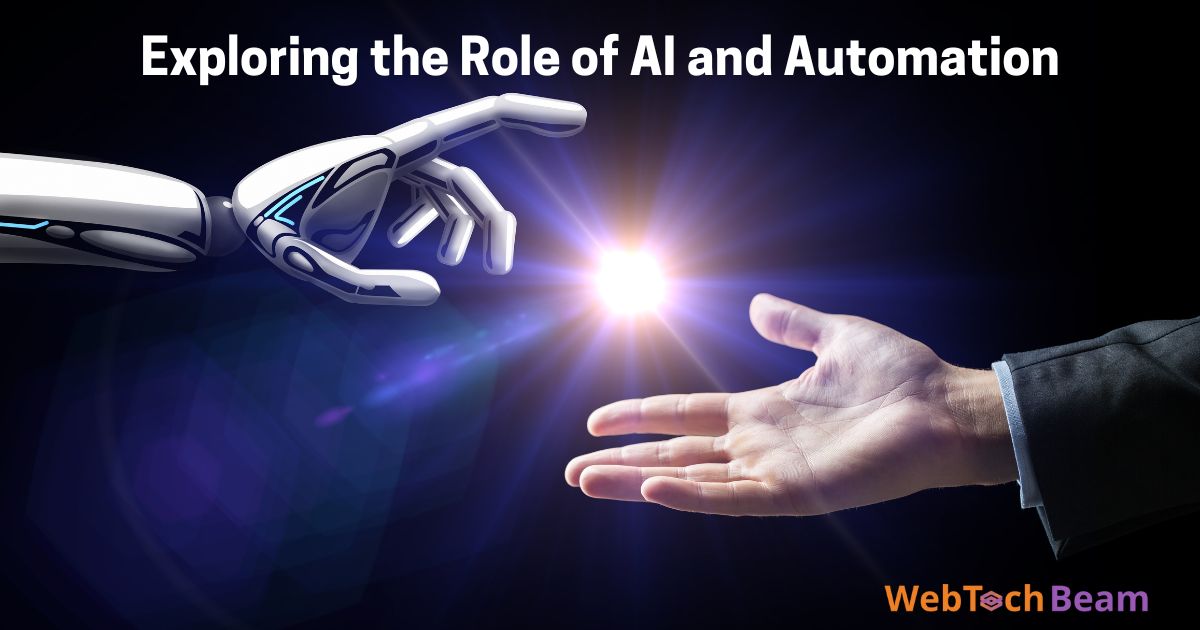In this guide, we will Explore the Role of AI and Automation in Transforming Commercial transactions that are being revolutionized through automation and synthetic intelligence (AI). They are using performance and sparking innovation throughout one-of-a-kind sectors. These technologies pass past simply improving operations; they’re basically changing how agencies interact.
According to Statista, in 2023, businesses encountered a significant challenge due to a lack of skilled individuals in the field of AI. Nearly 40% of organizations were unable to fill these positions because there were not enough suitable candidates available. With the continuous expansion of AI technology, around 80% of organizations predict a surge in demand for AI and machine learning expertise, thereby emphasizing the persistent shortage of talent.
By optimizing procedures and analyzing extensive records, synthetic intelligence and automation are augmenting decision-making, becoming indispensable tools for contemporary businesses. Therefore, embracing these advancements has become crucial to maintaining competitiveness.
What is the role of AI and Automation in Transforming?
AI and automation are reworking diverse industries, enhancing productiveness and innovation. These technologies streamline repetitive duties, permitting human beings to be aware of complex problems. Through machine-gaining knowledge, AI structures have strengthened their overall performance over the years. Automated strategies reduce human errors, making sure of regular, high-quality outputs.
For this reason, companies are able to operate more efficiently, saving time and resources. AI-driven analytics provide more comprehensive insights, facilitating better decision-making. Automation also improves customer experiences, delivering faster and more precise responses. As AI advances, it brings about opportunities and challenges for societies. Utilizing these technologies necessitates ethical considerations and careful monitoring. By implementing them correctly, future growth and sustainability will be driven.
Revolutionizing Commercial Real Estate with AI
AI and automation are revolutionizing the industrial real estate sector by streamlining complex processes. Advanced AI-driven tools can analyze large volumes of data to accurately predict market trends, empowering real estate professionals to make more informed decisions. Automation is simplifying tasks such as maintenance scheduling, lease management, and tenant communication in property management.
According to McKinsey, the real estate industry can make significant progress by leveraging generative AI. By incorporating advanced technology and drawing from past experiences, this offers a distinctive chance for growth. Unlike analytical AI, generative AI’s innovative abilities unlock fresh opportunities and applications that were previously unexplored. This could potentially bring about a transformative shift in the real estate sector, representing a value of up to $180 billion.
AI and automation have greatly affected underwriting in commercial real estate, as stated by Blooma. In the past, underwriting involved a lengthy procedure of evaluating property risks and values, necessitating the analysis of numerous financial documents and market data. However, with the advent of AI and machine learning models, this process can now be automated. These advanced technologies can swiftly analyze data from various sources, enabling a more precise assessment of property value and risk.
Furthermore, AI can use predictive analytics to project future property performance, allowing you to make more educated judgments and streamline your underwriting workflow. AI tools can identify patterns and potential risks that might not be immediately apparent through traditional methods by leveraging historical data and market trends. This enhanced accuracy in underwriting enables investors and lenders to make more strategic decisions, leading to more profitable real estate transactions.
How does automation fit into the property management process?

Automation makes property management jobs, such as maintenance scheduling, tenant communications, and lease administration, simpler. By streamlining tiresome procedures and eliminating administrative burdens, it enables more efficient property management. As a consequence, property managers can enhance operational efficiency and focus on strategic goals.
Enhancing Financial Transactions through Automation
The integration of AI and automation is revolutionizing financial transactions. Invoicing, price processing, and reconciliation are now efficiently handled by automated systems, reducing human errors and improving speed and accuracy. Additionally, AI algorithms are playing a crucial role in enhancing security measures by swiftly detecting and preventing fraudulent activities.
Smart contracts have revolutionized the landscape of felony cases by automating contract enforcement through the use of encoded provisions in their code.
Investopedia Highlights that smart contracts were first brought through Nick Szabo in 1994, long before Bitcoin’s debut. Szabo also proposed digital foreign money called “Bit Gold” in 1998, a decade before Bitcoin emerged. Despite the hypothesis that Szabo is probably the actual Satoshi Nakamoto, the true identification of Bitcoin’s writer remains unconfirmed.
Companies of all sizes are reaping the benefits of these technologies, as they make financial transactions greener, more secure, and transparent.
How does AI enhance financial transaction security?
The implementation of AI algorithms in financial transactions significantly boosts security measures by promptly detecting and preventing fraudulent activities. Through the analysis of transaction data, AI can identify patterns and anomalies, issuing timely alerts for potential issues. This state-of-the-art monitoring system effectively mitigates fraud risks and guarantees secure financial operations for businesses.
Transforming Customer Interactions in the Digital Era

Client interactions are being transformed by AI and automation, and chatbots and digital assistants are at the forefront of this revolution. These tools are accessible 24/7 to address inquiries, handle orders, and offer specialized assistance. AI-driven customer relationship management (CRM) systems analyze customer data to anticipate needs and personalize services.
Future Market Insights States that the worldwide marketplace for AI-powered CRM systems is set to grow extensively. An incredible boom charge of eleven.50% is projected from 2024 to 2034 for the market of AI-enabled CRM. It is anticipated that this market could be valued at $114.7 million by way of the cease of 2024. Over the following decade, numerous marketplace forces will force this boom, ultimately reaching $340.6 million by 2034.
The utilization of automation enhances processes such as order tracking and customer support, resulting in an even better purchasing experience. By harnessing AI and automation, businesses are delivering faster, more efficient, and personalized customer service, ultimately driving higher levels of satisfaction and loyalty.
Why is there a sudden increase in demand for AI skills?
Due to the significant expansion of AI technologies in various industries, there is an increasing demand for AI skills. Companies are now in need of professionals who can efficiently develop, implement, and manage AI systems. As the number of AI applications is expected to rise, organizations are actively searching for qualified experts to fill the talent shortage in this field.
The commercial landscape is being transformed by AI and automation, driving efficiency and fostering innovation in multiple sectors. These advanced technologies are enhancing real estate transactions, bolstering economic security, and completely reshaping consumer interactions. As a result, they have become indispensable tools for contemporary businesses.
Nevertheless, the demand for additional skilled AI specialists poses a significant challenge. As AI continues to advance, it becomes crucial for companies to overcome this expertise gap in order to fully leverage its potential. By incorporating AI and automation, businesses can optimize their operations and position themselves for long-term success in today’s competitive digital era.
Frequently Asked Questions (FAQs)
What is the role of artificial intelligence, machine learning, and automation in business processes?
Business operations are streamlined by AI, machine learning, and automation. These technologies enhance efficiency by managing repetitive tasks, leading to a reduction in human error and ensuring consistent quality. Moreover, they allow employees to allocate their time towards more intricate tasks.
What are the benefits of AI and the automation of work for businesses?
AI and automation have a significant impact on productivity, allowing for faster completion of repetitive tasks and saving valuable time. Moreover, these technologies effectively reduce costs and greatly enhance accuracy. Consequently, businesses can operate with greater efficiency. Additionally, AI and automation provide advanced analytics that enable improved decision-making processes.
How is AI transforming business and industry?
The revolution of AI brings about a transformation in industries as it automates mundane tasks, predicts trends through data analysis, and enhances customer experiences with prompt responses. This leads to a heightened level of agility and innovation within businesses, enabling them to remain competitive in the market.
What is AI automation with an example?
AI automation is the integration of AI and automation to carry out tasks autonomously, without the need for human involvement. An illustration of this concept is the utilization of AI by chatbots to promptly address customer inquiries. Through continuous learning from these interactions, chatbots enhance their performance over time. The implementation of such automation not only saves time but also enhances the quality of customer service.
What is the impact of AI automation?
The utilization of AI automation significantly enhances efficiency by minimizing human errors and boosting productivity. This allows employees to dedicate their time to strategic tasks, while also resulting in cost savings and improved customer interactions. Furthermore, automation ensures consistent and high-quality outputs.
Why are artificial intelligence and automation needed at the time?
Modern innovation is propelled by AI and automation, addressing the rising need for efficiency. These advanced technologies effortlessly manage the growing volumes of data, providing businesses with a competitive advantage. Moreover, they present novel prospects for growth and sustainability.
What is automation with an example?
Technology is utilized in automation to carry out tasks without the need for human intervention. An instance of this is seen in automated emails that promptly respond to customer inquiries, facilitating swift communication and time savings. Businesses adopt automation to streamline their operations, leading to enhanced productivity and service efficiency.
Conclusion
The implementation of AI and automation plays a vital role in revolutionizing the way businesses carry out transactions. By improving efficiency and lowering expenses, these technologies contribute to streamlining operations. The automation of tasks guarantees uniformity and enhances the quality of services provided. Consequently, companies can allocate their resources to tackle more intricate strategies. Moreover, AI-powered analytics provide businesses with valuable insights into market trends, enabling them to remain competitive and up-to-date. However, it is crucial to take ethical considerations into account when implementing AI to ensure responsible usage. By utilizing these technologies appropriately, businesses can anticipate growth and sustainability in the long run.
Exploring the Role of AI and Automation in Transforming Commercial Transactions (webtechbeam.com)

